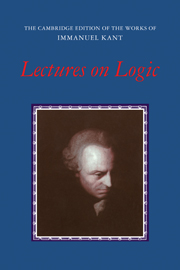Translator's introduction
Published online by Cambridge University Press: 05 June 2012
Summary
THE IMPORTANCE OF KANT'S LOGIC LECTURES
Kant's views about the nature of logic, and about various points of logical theory as well, figure prominently in his Critical works. This is especially true in the first and most fundamental of those works, the Critique of Pure Reason. Indeed, Kant characterizes the Critique – or the major portion of it, at least – as an essay in transcendental logic. This means, on the one hand, that the work is to be understood as containing something different from logic, something that does not deal merely with the canons of all thought, but with the concepts and principles governing knowledge of objects in space and time. It also means, however, that both in the broad sweep of its architectonic and in the detail of much of its argument the Critique assumes familiarity with Kant's views on logic; for transcendental logic, though different from logic proper, is supposed to build upon the latter. In dividing transcendental logic into an Analytic and a Dialectic, in deriving the table of categories, in classifying the dialectical inferences of pure reason, and in numerous other instances as well, Kant simply assumes that his readers are familiar with his views on logic.
- Type
- Chapter
- Information
- Lectures on Logic , pp. xv - xxxiiPublisher: Cambridge University PressPrint publication year: 1992



